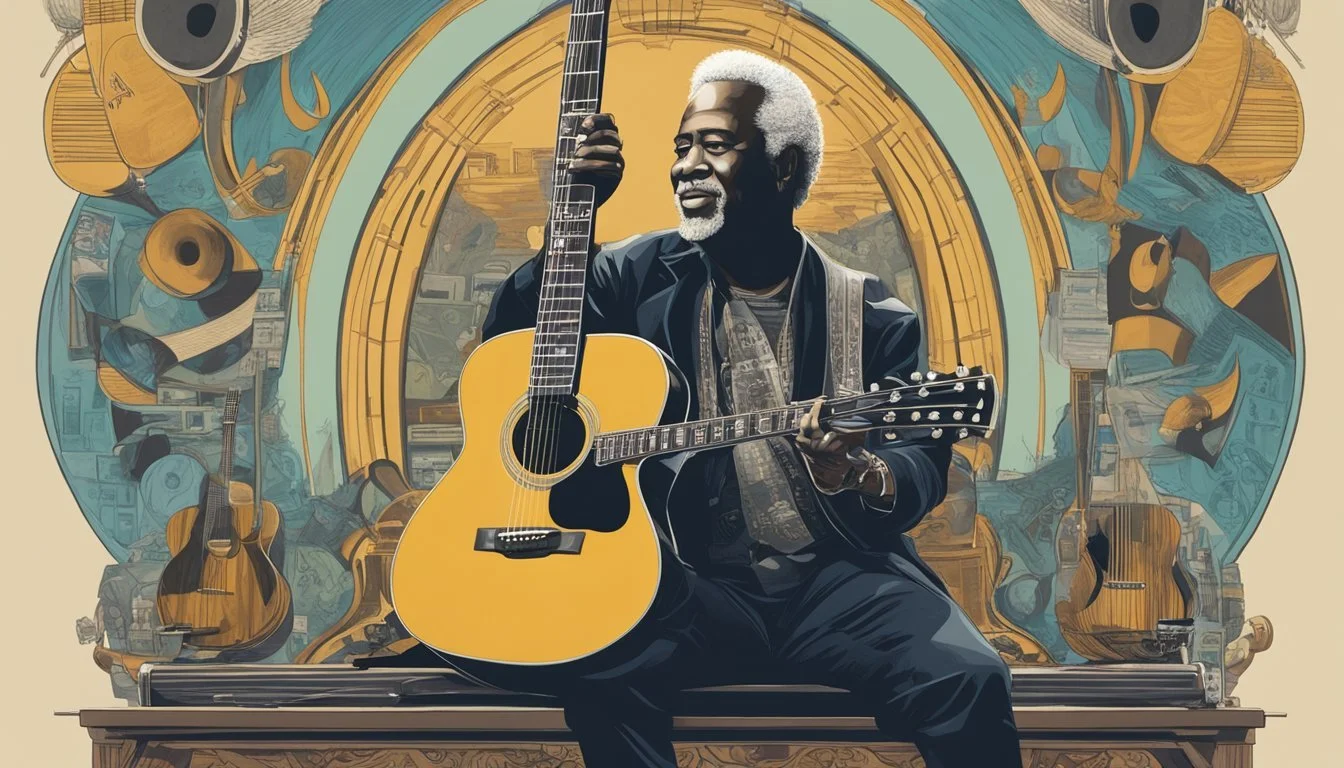8 Ways "Willie Nelson & Family" Captures Willie's Legacy
A Definitive Look at the Country Icon's Musical Journey
The new documentary series "Willie Nelson & Family" offers viewers an intimate look at the life and career of one of country music's most iconic figures. Through five carefully crafted episodes, directors Thom Zimny and Oren Moverman explore Willie Nelson's journey from humble Texas roots to his status as a legendary musician and cultural influencer.
The docuseries delves into Willie Nelson's profound impact on American music and culture, highlighting his role in shaping the outlaw country movement and founding major music festivals. It also showcases his personal life, including relationships with family members and his experiences with both triumphs and challenges. By examining these various aspects of Nelson's life and career, the series provides a comprehensive portrait of the artist's enduring legacy.
1) His First Album Release: 'And Then I Wrote'
Willie Nelson's debut album, 'And Then I Wrote,' marked the beginning of his illustrious recording career. Released in 1962 on Liberty Records, this collection showcased Nelson's songwriting prowess.
The album featured original compositions that would later become country music standards. Songs like 'Crazy,' 'Funny How Time Slips Away,' and 'Hello Walls' demonstrated Nelson's unique lyrical style and melodic sensibility.
Despite its significance in Nelson's career, 'And Then I Wrote' did not achieve immediate commercial success. However, it laid the foundation for his future as a songwriter and performer.
The album's title reflected Nelson's primary role at the time as a songwriter for other artists. Many of the tracks had already been recorded by established country stars before Nelson's own versions were released.
'And Then I Wrote' provided listeners with their first taste of Nelson's distinctive vocal style. His nasal twang and unconventional phrasing set him apart from other country singers of the era.
2) Signature Song: 'On the Road Again'
'On the Road Again' stands as Willie Nelson's most recognizable tune. The song encapsulates his nomadic spirit and love for performing live.
Released in 1980, it quickly became an anthem for travelers and music lovers alike. Its catchy melody and relatable lyrics about life on tour resonated with audiences worldwide.
The track's success earned Willie a Grammy Award for Best Country Song in 1981. It has since been featured in numerous films, TV shows, and commercials, cementing its place in popular culture.
'On the Road Again' continues to be a staple of Willie's live performances. Fans eagerly anticipate hearing the opening notes at his concerts, often singing along word for word.
The song's enduring popularity reflects Willie's ability to connect with listeners through simple, heartfelt storytelling. It remains a testament to his songwriting prowess and his lasting impact on country music.
3) Founding Member of the Highwaymen
Willie Nelson played a pivotal role as a founding member of the country supergroup The Highwaymen. Formed in 1985, the group brought together four legendary figures in country music: Willie Nelson, Johnny Cash, Waylon Jennings, and Kris Kristofferson.
The Highwaymen's formation showcased Willie's ability to collaborate with other iconic artists. Their self-titled debut album, released in 1985, featured the hit single "Highwayman," which reached number one on the country music charts.
The group's success extended beyond their musical achievements. They represented a collective of outlaw country pioneers who had reshaped the genre in the 1970s and continued to influence it in the 1980s and beyond.
Willie's involvement in The Highwaymen highlighted his status as a respected peer among country music's greatest talents. The supergroup released three studio albums and embarked on multiple tours, cementing their place in country music history.
Through The Highwaymen, Willie Nelson further solidified his legacy as not just a solo artist, but also a collaborative force in country music. The group's formation and success demonstrated Willie's enduring relevance and ability to connect with audiences across generations.
4) Iconic Album: 'Red Headed Stranger'
'Willie Nelson & Family' highlights the monumental impact of Nelson's 1975 album 'Red Headed Stranger'. This groundbreaking concept album marked a turning point in Willie's career and country music as a whole.
'Red Headed Stranger' showcased Nelson's innovative approach to songwriting and storytelling. The album's stripped-down sound and narrative structure were revolutionary for its time, challenging conventional country music norms.
Critics and fans alike embraced the album's unique style. Its commercial success helped solidify Nelson's status as a leading figure in the outlaw country movement of the 1970s.
The documentary emphasizes how 'Red Headed Stranger' exemplifies Nelson's artistic vision and willingness to take creative risks. It demonstrates his ability to blend traditional country elements with fresh, progressive ideas.
Through this iconic album, 'Willie Nelson & Family' captures a pivotal moment in Nelson's legacy. It shows how his musical innovations continue to influence country artists today.
5) Farm Aid Concert Co-founder
Willie Nelson's commitment to supporting American farmers shines through his co-founding of Farm Aid in 1985. This annual benefit concert raises awareness and funds for family farmers facing economic challenges.
Nelson's rural upbringing in Abbott, Texas, fostered a deep connection to agricultural communities. This personal history inspired his dedication to the cause.
Farm Aid has become one of the longest-running benefit concerts in the United States. It brings together musicians, farmers, and fans to celebrate family farm agriculture and raise money for struggling farmers.
As a co-founder, Nelson continues to headline the event each year. His involvement helps maintain Farm Aid's visibility and impact on supporting sustainable agriculture.
The concert series has raised millions of dollars over the decades. These funds provide direct support to family farmers and promote awareness of issues affecting rural communities.
Nelson's role in Farm Aid demonstrates his ability to use his musical platform for social good. It showcases his dedication to causes beyond the entertainment industry.
6) Legendary Outlaw Country Movement
Willie Nelson played a pivotal role in shaping the Outlaw Country movement of the 1970s. This subgenre emerged as a rebellion against the polished Nashville sound that dominated country music at the time.
Nelson's album "Red Headed Stranger" (1975) became a cornerstone of the Outlaw Country ethos. It showcased a rawer, more authentic approach to country music that resonated with audiences seeking something different.
The documentary "Willie Nelson & Family" highlights Nelson's contributions to this groundbreaking movement. It explores how he challenged industry norms and paved the way for a new generation of country artists.
Nelson's collaborations with fellow Outlaw Country artists like Waylon Jennings and Kris Kristofferson are also featured. These partnerships helped solidify the movement's place in country music history.
The series delves into how Nelson's distinctive sound and songwriting style influenced the Outlaw Country genre. His unique blend of country, folk, and jazz elements became a hallmark of the movement.
7) Hit Album: 'Stardust'
Willie Nelson's 1978 album 'Stardust' marked a significant milestone in his career. The album showcased Nelson's versatility as he covered classic pop standards from the Great American Songbook.
Produced by Booker T. Jones, 'Stardust' featured Nelson's unique interpretations of timeless songs like "Georgia on My Mind" and "All of Me." His distinctive vocal style and guitar work breathed new life into these familiar tunes.
The album's success was unprecedented. It spent an astounding 540 weeks on the Billboard Top Country Albums chart, becoming the first album to remain on the chart for over a decade.
'Stardust' earned Nelson a Grammy Award for Best Male Country Vocal Performance. It also achieved multi-platinum status, selling over 5 million copies in the United States alone.
The album's enduring popularity demonstrated Nelson's ability to transcend genre boundaries. It solidified his status as a crossover artist, appealing to both country and pop audiences.
8) Willie's Torch Signature Guitar
Willie Nelson's iconic guitar, named Trigger, plays a starring role in the "Willie Nelson & Family" docuseries. This battered instrument has been Nelson's constant companion for decades, shaping his distinctive sound.
Trigger's name comes from Roy Rogers' horse, reflecting Nelson's cowboy image and love of Western culture. The guitar's worn appearance tells the story of countless performances and recording sessions.
Fans instantly recognize Trigger's unique sound, which has become synonymous with Nelson's music. The docuseries offers viewers a glimpse into the deep connection between Willie and his beloved instrument.
Trigger's significance extends beyond its musical role. It represents Nelson's enduring career and his authentic approach to country music. The guitar has witnessed Willie's journey from humble beginnings to country music stardom.
Through Trigger, the documentary illustrates how Nelson's simple, stripped-down style helped shape the outlaw country movement. This iconic guitar embodies Willie's legacy as a musician who stayed true to his roots.
Willie Nelson's Musical Journey
Willie Nelson's musical career spans over six decades, marked by innovation, perseverance, and an unwavering commitment to his craft. His journey from humble beginnings to becoming an iconic figure in American music is a testament to his talent and determination.
Early Beginnings
Willie Nelson's musical roots trace back to his childhood in Abbott, Texas. Born in 1933, he was raised by his grandparents who introduced him to music at a young age. Nelson learned to play guitar as a child and began writing songs in his teens.
His first professional gig came at the age of 13, playing in a local polka band. In the 1950s, Nelson moved to Vancouver, Washington, where he worked as a DJ and continued to hone his songwriting skills.
During this time, he penned classics like "Family Bible" and "Night Life," showcasing his talent for crafting emotionally resonant lyrics.
Rise to Fame
Nelson's move to Nashville in 1960 marked the beginning of his rise to prominence. Initially, he found success as a songwriter, penning hits for other artists such as Patsy Cline's "Crazy" and Faron Young's "Hello Walls."
In the late 1960s, Nelson began focusing on his own recording career. His unique vocal style and blend of country, folk, and jazz elements set him apart from mainstream country artists.
The 1970s saw Nelson emerge as a key figure in the Outlaw Country movement. Albums like "Shotgun Willie" (1973) and "Red Headed Stranger" (1975) solidified his status as a groundbreaking artist.
His collaborations with other musicians, including the supergroup The Highwaymen, further expanded his influence and popularity.
Influence on Country Music
Willie Nelson's impact on country music is profound and far-reaching. His unique style and extensive collaborations have shaped the genre for decades, influencing countless artists and pushing musical boundaries.
Unique Style and Sound
Willie Nelson developed a distinctive sound that blended country, jazz, and folk elements. His nasal vocal tone and unconventional phrasing became instantly recognizable. Nelson's guitar playing on his trusty acoustic guitar "Trigger" added another layer of uniqueness to his music.
Nelson helped pioneer the outlaw country movement in the 1970s. This subgenre challenged the polished Nashville sound with a rawer, more authentic approach. His albums "Shotgun Willie" and "Red Headed Stranger" exemplified this new style.
His songwriting often focused on honest, relatable themes. Nelson's lyrics tackled love, loss, and the struggles of everyday people. This authenticity resonated deeply with listeners and fellow musicians alike.
Collaborations and Impact
Nelson's willingness to collaborate across genres expanded country music's reach. He recorded duets with artists from various backgrounds, including Ray Charles, Julio Iglesias, and Snoop Dogg. These partnerships introduced country music to new audiences.
His annual Farm Aid concert series, started in 1985, brought together diverse musical acts for a common cause. This event showcased country music alongside rock, pop, and other genres, further broadening its appeal.
Nelson's influence extends to younger generations of country artists. Many cite him as a major inspiration, from his songwriting to his vocal style. His longevity in the industry has made him a role model for aspiring musicians.
His impact on country music festivals is significant. Nelson co-founded the Outlaw Music Festival, which continues to celebrate the spirit of outlaw country and Americana music.
Legacy of Willie Nelson & Family
Willie Nelson's enduring impact spans music, activism, and popular culture. His contributions have shaped American society in profound ways, while his ongoing philanthropic efforts continue to make a difference.
Cultural Contributions
Willie Nelson's influence extends far beyond country music. His distinctive sound blends country, jazz, and folk, creating a unique style that resonates across generations. Nelson's songwriting has produced timeless classics like "Crazy" and "On the Road Again," cementing his place in music history.
His advocacy for farmers through Farm Aid concerts has raised awareness and millions of dollars since 1985. Nelson's support for environmental causes and cannabis legalization has sparked national conversations. His acting career, highlighted in the Paramount+ docuseries, showcases his versatility as an entertainer.
Ongoing Philanthropy
Willie Nelson's charitable work remains a cornerstone of his legacy. He continues to support various causes, focusing on rural communities and music education. The Willie Nelson Peace Research Institute promotes peaceful conflict resolution and environmental sustainability.
Nelson's annual Fourth of July Picnic brings together musicians and fans while supporting local charities. His collaboration with his wife Annie on the Willie and Annie Nelson Professor in Stem Cell Research at the University of Texas benefits medical research. Through these efforts, Willie Nelson demonstrates a commitment to using his influence for positive change.








